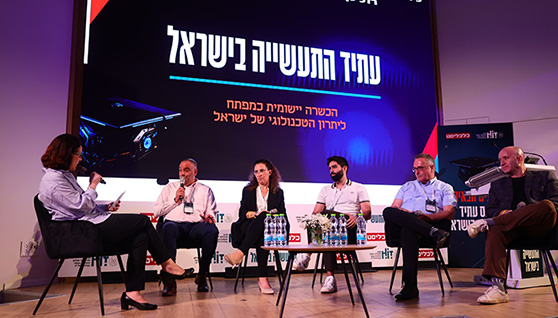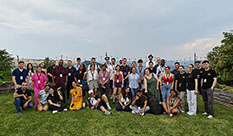More:
News & Stories
"The Future of Industry in Israel" – A Conference in Partnership with "Calcalist" Held at HIT
Under the headline "Shaping the Next Generation of Technological Training in Israel," a conference was held at HIT Holon Institute of Technology in partnership with "Calcalist" and hosted by Neta-Lee Bienstock, addressing various aspects of the future of industry in Israel from a training perspective.

Panel on Digital Medicine and Artificial Intelligence. Photo: Ascaf
The State of Israel is facing a growing shortage of professionals in the fields of engineering and technology, which are critical to maintaining its economic, security, and social strength. The conference engaged in strategic discourse on the importance of recruiting quality personnel trained with practical training relevant to industry needs, as opposed to traditional academic training, and on the required revolution in the field and how to bring about the necessary change.
The conference was opened by Mr. Pini Cohen, Chairman of the Board of Trustees of HIT - Holon Institute of Technology, who said: "There is a triangle whose sides consist of the Government of Israel, academia, and industry. Its strength lies in teamwork, and as we look to the future and the future of the industry in Israel, it is clear that this triangle must work optimally and be updated according to changing needs."
HIT's President, Prof. Eduard Yakubov, said: "We are here to serve the industry, and its future is very important to us. In order to serve the industry in the best way, we must know what needs to be added and how to adapt the training of our students to real needs."

Prof. Yakubov in conversation with Shahar Ilan. Photo: Ascaf
Following the opening remarks, several professional panels of industry and academia professionals were held, discussing important issues such as: how to adapt academia to the changing challenges of the State of Israel in an era of technological revolution; the medical industry of the future; on wisdom and humanity: responsible navigation in the AI era; a future perspective on the integration of humans and machines, and what is required to get there.
In conversation with "Calcalist" correspondent Shahar Ilan, Prof. Eduard Yakubov said: "We are the only institution that presents an annual growth of 6% to 8% in the number of students. There is, of course, a decline due to AI in computer science, but we are experiencing growth in the electrical and electronics engineering tracks. This is an important achievement. Overall, the number of students is rising with us, and this is critical for higher education in the country. The war has shown us the complex challenges that exist, but we must look ahead, four years from now, and think now about the modern tools that will save soldiers' lives - such as autonomous systems and artificial intelligence."

IAI CEO Boaz Levy. Photo: Ascaf
In response to the question of whether AI will make engineers obsolete, Prof. Yakubov replied: "We are in the era of generative AI, which is based on processing past statistics. The combination of human and artificial intelligence here is the key to success. When the computer appeared, they said we wouldn't need people who know arithmetic - and yet, we do. But it is important to know what challenges we need to focus on. We must give our students the ability to cope. I am convinced that the higher education system is an engine of growth that will enable us to be a strong nation. AI is our partner, our friend. Today, people look at their smartphones more than they look at their family members, and we must learn these systems and incorporate them into curricula so that we can deal with real problems."
Mr. Boaz Levy, CEO of Israel Aerospace Industries, said at the conference that "Israel has experienced events in the past two years that no one else has endured, such as heavy and coordinated barrages toward civilian population areas. Our systems on this matter were developed 30 years ago, and if the Iranians or Houthis try to surprise us – again we will be ready."
Hadas Lorber, Head of the Research Institute for Responsible AI at HIT and Director of Israel-US Partnerships at INSS, said at the conference that "HIT has made it its mission to be the academy of industry, and this is no small matter. This is the direction that HIT's president has been pursuing over the past six months. Within this framework, Israel's first applied research institute for responsible AI looks not only at technological advancement, but also at how to do so responsibly. Many processes are taking place here and it's necessary to keep our finger on the pulse. Therefore, it's important to navigate correctly in the AI era and integrate wisdom with humanity, and consequently understand the prominent developments in the field: foremost, the inter-superpower race and the struggle for technological leadership. We are at the threshold of the decisive decade for the world order, which will determine who will control the technological dome."

Prof. Shaul Bar-Lev, Dr. Refael Barkan, Prof. Eduard Yakubov, Mr. Pini Cohen, Mr. Yoel Esteron, Mr. Samuel Goldberg. Photo: Ascaf
Dr. Refael Barkan, Vice President for Innovation, Entrepreneurship and Internationalization, founder of the Digital Medical Technologies program, said: "We also saw the need to train people who speak both languages: the technological language and the medical one. Israel is a medical information superpower. We are certainly equipped with very significant assets, and there is a need for human resources that will make use of these assets. Academic training is also required alongside a certain degree of creativity and breaking conventions. Not going for the classic academic solutions of gluing two degrees together, but rather breaking things down into the smallest details and creating a new profession. A new degree that will suit market demands, and that truly produces medical data analysts, who work in innovation centers, major companies like Biomed and Informed. But on the other hand – technological physicians who continue to a four-year track and graduate as doctors with very significant knowledge, which is today the most important catalyst for medical research, data and AI."
Prof. Gila Kurtz, Dean of the Faculty of Instructional Technologies, spoke about the need to integrate artificial intelligence into the curriculum and noted that the challenge is great, and that industry demand is enormous. The students of the Faculty of Instructional Technologies are in high demand, and every move must, in her words, be done together with the students and by listening to their viewpoints.
The fascinating and interesting conference concluded with the understanding that applied training is the key word in the ability to meet the changing needs of the industry, and in the possibility for students to integrate into a wide range of relevant and innovative fields, and therefore it was of great importance.
- News & Events
International Week of Interdisciplinary Studies and Academic Collaborations in Crete
A substantial delegation of 16 students and four faculty members from HIT Holon Institute of Technology participated in week-long international activities and events at HMU-Hellenic Mediterranean University in Crete. ...


 Additional programs
Additional programs
